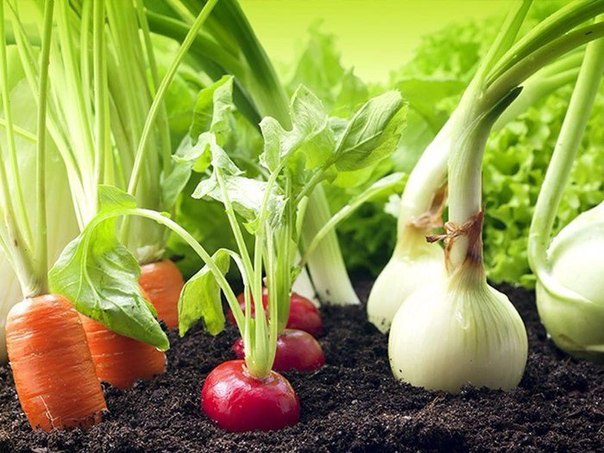Bulgarian pepper - one of the most common vegetables grown in our country. It is valued by gardeners for its taste, as well as a large composition of vitamins and trace elements. In terms of vitamin C, Bulgarian pepper is superior to all other vegetables.
Table of contents
- The role of the alternation of vegetables at their summer cottage
- Then you can plant Bulgarian pepper?
- After which crops is it not recommended to plant sweet peppers?
- The most favorable neighbors of Bulgarian pepper
- Sweet pepper as a precursor in the garden
- Table of crop rotation of vegetables at their summer cottage
The role of the alternation of vegetables at their summer cottage
The yield of any crops, including Bulgarian pepper, depends on the choice of the landing site in the garden and the maintenance of crop rotation. Therefore, it is very important to plan the location of the landings and their neighbors before landing. Crop rotation is a certain rule in planting crops, it is necessary to know exactly which vegetables and after whom you can plant. The amount of harvest and the health of plants depend on the correctness of the fruit change.
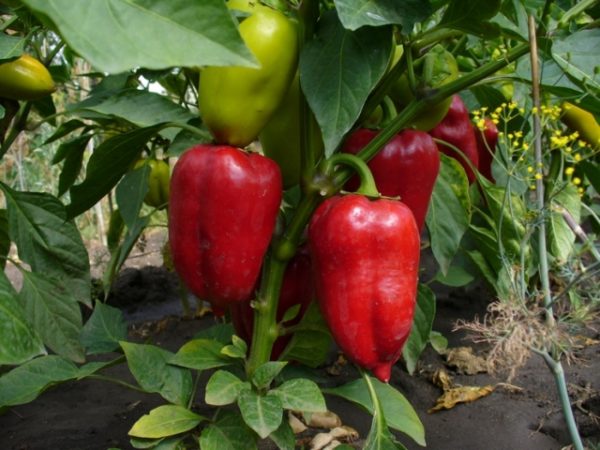
Each vegetable treats weeds differently. So, most often the beds are left without weeds after cabbage, peas or potatoes, thanks to which it is easier to grow other crops in their place. Each culture has its own biological features, therefore, to prevent the appearance of insects and weeds, it is worth alternating between them so that they are in their place no earlier than 4 years. This rule helps prevent soil depletion and increases its fertility.
Then you can plant Bulgarian pepper?
Before planting, it must be remembered that it does not tolerate any kind of organic fertilizer at all.. Because of this, it is best to deposit them in the soil where it will grow a year before planting. Only after a while can the Bulgarian seedlings be planted in this place.
Planting technology of this culture is not much different from planting tomatoes. A vegetable like no one else needs fertile soil filled with useful substances. Therefore, when planting sweet pepper in the wells, special fertilizers should be added to the seedlings. It grows rather slowly. Due to the nature of the placement of the root system, it needs a lot of moisture. The roots are located in the upper layers of the soil, and therefore require frequent watering.
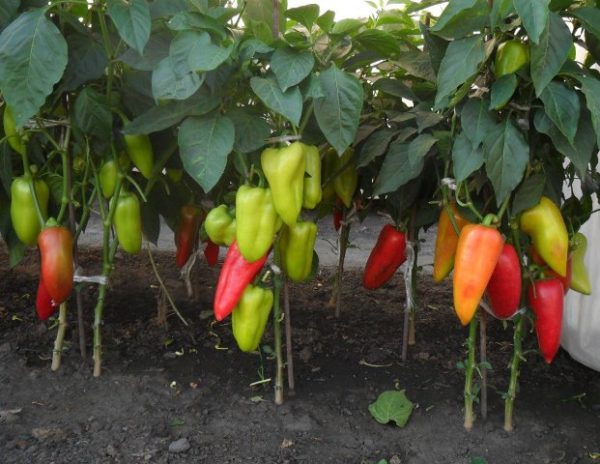
Then it is better to plant pepper:
- Pumpkins;
- Carrots;
- Cucumbers;
- Kabachkov.
- Patisson
These crops fertilize the soil well, after them it is not necessary to loosen it, so the land is ideal for a Bulgarian vegetable. Onions and garlic can also be excellent predecessors. Not a bad harvest of vegetables can turn out in the beds, where before there were roots.
After which crops is it not recommended to plant sweet peppers?
- Physalis;
- Eggplant;
- Potatoes;
- Tomatoes;
- Tobacco
Land before planting must be cleared of weeds and fertilized. It is better to plant seedlings in warm weather and in well-warmed soil. Dry yeast can be used as a top dressing.. A packet of dry yeast and 2 tbsp is dissolved in a bucket of water. spoons of sugar. Mixture insist for 2 hours, then pour it planted plants.
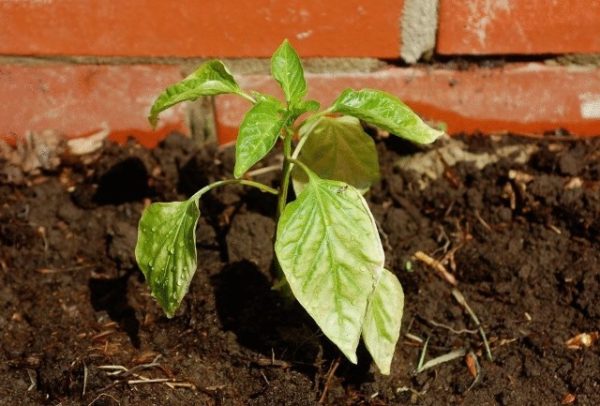
The most favorable neighbors of Bulgarian pepper
To obtain good yields, it is important not only to follow the rules of crop rotation, but also to choose the right neighbors in the beds. The right choice of neighboring crops will help to create natural safe protection for the Bulgarian pepper, protect it from the strong wind, scare away pests. The environment has the same great effect on vegetables as the soil in which they grow. Not properly seated neighbors are a source of infection by insects and other diseases, and can also simply act depressingly.
The best bean is considered to be the best neighbor for the sweet pepper. The fact is that the pests attacking the whole season with pepper do not tolerate its aroma at all, therefore, most likely they will not settle on it while such a “neighbor” is next to it. Another advantage of joint cultivation is the compatibility of these crops for nutrients in the soil. Legumes have a beneficial effect on the soil, feeding it with minerals and nitrogen fertilizers, which is very important for pepper.
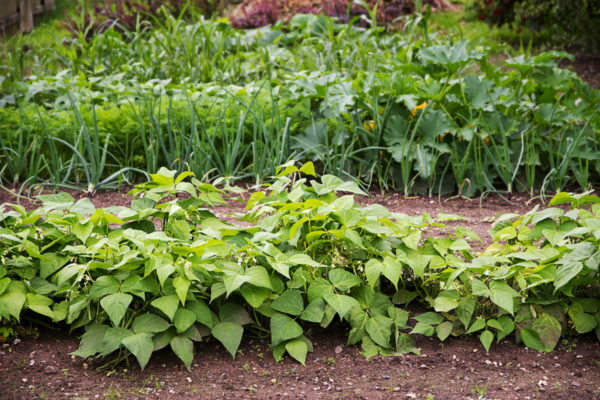
Sweet pepper as a precursor in the garden
After the Bulgarian handsome it is better not to plant the following vegetables:
- Squashes;
- Eggplant;
- Pumpkin;
- Cucumbers;
- Tomatoes.
Pepper for the season rather strongly devastates the land in which it grows, takes from it all the nutrients and trace elements necessary for growth above the designated vegetables. Best after it will grow plants such as asparagus, leek, basil.
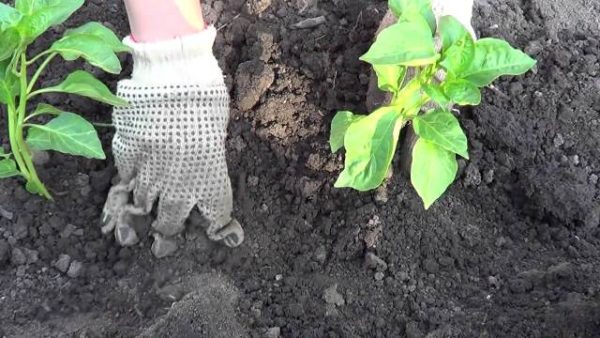
Table of crop rotation of vegetables at their summer cottage
| Vegetable culture | Fit | Unsuitable | Neutral |
| Potato | Bean cultures, cabbage, cucumbers | Tomatoes, eggplants, bitter and sweet peppers | Onions, beets, carrots |
| Tomatoes | Cucumbers, turnips, cabbage, greens | Potatoes, bell peppers, strawberries | Late cabbage, beets, onions, radishes |
| Onions or garlic | Potatoes, beans, cucumbers, carrots | Physalis, pepper | Cabbage, beets, tomatoes |
| Tomato | Onions, cabbage, cucumbers, greens, carrots | Physalis, Solanaceae | Beetroot |
| Cucumbers | Beans, onions, cabbage, turnips | All pumpkin, zucchini, cucumber | Beetroot, greens |
| Coriander, Basil, Mint | Cucumber, zucchini, pumpkin, onion, garlic | Carrots, turnips, cabbage | Corn, beets, eggplants |
| Zucchini | Solanaceae, onions, cabbage | All pumpkin | Beetroot, greens |
| Pumpkin | Onions, beans, cabbage, solanaceous crops | All pumpkin | Beetroot, greens |
| Beans, Peas | Cucumbers, onions, cabbage, garlic, basil | Beans, Eggplant, Tomatoes | Greens, siderata, root vegetables, tomatoes |
Only guided by all the rules of planting vegetables, taking into account their needs and using the table rotation, when landing on the beds can achieve high crop yields and soil fertility. Even despite the rather labor-intensive process of growing and caring for sweet peppers, it still remains the favorite vegetable gardeners. Every year, in spite of the weather conditions, it pleases us with its bright and tasty fruits.
